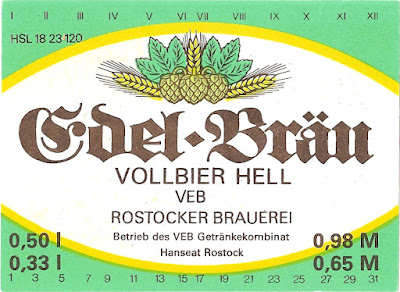The hopping specifications are very different owing to the introduction of hop extract. Meaning that the hopping rate can't be given in gm/hl any more. Instead, active bitter substances are specified. Not really sure what that means. But at least the relative hopping rates are still obvious.
Several new ingredients have been added, notably amongst the adjuncts, where rice grits and maize grits have appeared.
On the sour side, there much of interest. Dekkera bruxellensis - Brattanomyces to you and me - is specifically mentioned. Also, that it was only for Porter. Interestingly, no restriction was placed on the use of Lactobacillus. You would have thought that was only appropriate for Berliner Weisse.
What was lactic acid being used for? Was it as a souring shortcut for Berliner Weisse? Or did it have some other use?
Berliner Weisse had to have a minimum of 30% wheat malt. While Weizenbier had to include at least 20%.
| 1980 DDR beer ingredients | |||
| Category | Type | kg malt per hl | Hops, hop extract expressed in active bitter substances g/hl |
| Alkoholfreies Bier | Aubi | 11 | 9 |
| Einfachbier | Dunkel | 9 | 1.9 |
| Schankbier | Weißbier | 11.5 | 4.2 |
| Vollbier | Extra | 14.5 | 9.7 |
| Hell | 16.2 | 8.5 | |
| Edel-Bräu Hell | 17.2 | 8.5 | |
| Dunkel | 17.2 | 8.5 | |
| Doppe1-KarameIbier | 10.5 | 1.8 | |
| Schwarzbier | 19 | 10 | |
| Deutsches Pilsner | 19.2 | 11.5 | |
| Diabetiker-Pils | 18 | 15 | |
| Deutsches Pilsator | 19.2 | 16 | |
| Deutsches Pilsner Spezial | 20.2 | 16 | |
| Märzen | 24 | 10 | |
| Weizenbier | 18 | 4.5 | |
| Starkbier | Weißer Bock or Bockbier Hell | 26 | 8 |
| Dunkler Bock or Bockbier Dunkel | 26 | 8 | |
| Deutscher Porter | 34 | 22 | |
| Source: | |||
| 1980 TGL 7764, page 2. | |||
Here's the full list of permitted ingredients.
4. RAW MATERIALS AND ADDITIVES
All raw materials and additives must comply with food law regulations,
Brewing malt according to TGL 17756
Hops for brewing according to TGL 26778/01
Hop extract according to TGL 34097
Unmalted barley according to TGL 25709/01
Rice grits for brewing according to TGL 23219
Sugar (sucrose) according to TGL 3070/01
Caramel according to TGL 36604
caramel
maize grits
Saccharin according to the 2nd pharmacopoeia of the GDR (2nd AB - GDR)
brewing water
Fermentation organisms:
Saccharomyces uvarum (carlsbergensis)
Saccharomyces cerevisiae
Dekkera bruxellensis
Lactobacterium delbrückii
Enzyme preparations:
Brewery enzyme according to TGL 29166/01
amylases
proteases
ß-glucanases
Organic acids:
Lactic acid according to TGL 24132
Adipic acid according to TGL 6964
Salts
Calcium chloride according to 2. AB - DDR
Calcium sulphate according to 2. AB - DDR
Cooking salt B according to TGL 21020/03
or rock salt according to TGL 21020/02
Stabilizing agent
tannin
silica gel preparations
tannin adsorbents
pepsin concentrate
papain
1-ascorbic acid according to TGL 20130
bentonites
1980 TGL 7764, pages 2 - 3.












































































5 comments:
Lactic acid to adjust the acidity of the liquor before mashing.
I was trying to figure out the "bitter substances" stuff a while back. If the "bitter substances" are just dissolved isohumulone, it should be straightforward to map the numbers to IBU.
I would guess that the lactic acid would be used to lower mash pH. Either added straight into the mash or else it is sprayed onto pilsner malt to create acidulated malt (sauermalz).
Acid additions can be added during the mash to adjust mash ph (often trying to get closer to a 5.2 ph). So the lactic & adipic acid may be used for that purpose, instead of as a nonfermentation route to a berliner weisse (though it could easily be used for that purpose, too).
As a homebrewer, I have used lactic acid to lower the pH of the mash of very pale beers such as pilsner or kolsch, when I am out of acid malt. That doesn't comply with the Reinheitsgebot, but as you noted earlier in this series, the DDR didn't care so much about that.
TGL 24132 might tell you more, but I would assume that lactic acid would be used for (mash) pH adjustment.
Post a Comment